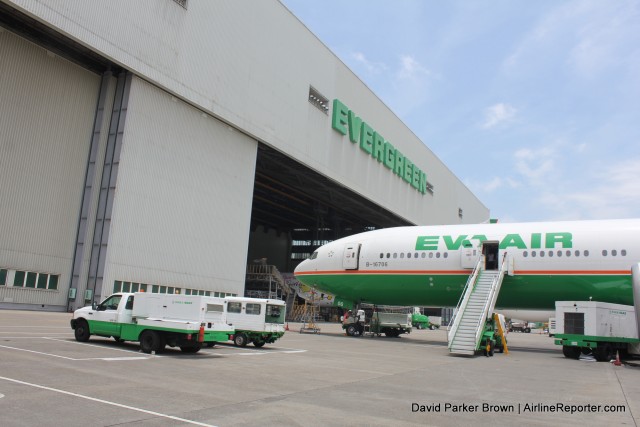
An EVA Air Boeing 777-300ER being worked on
During my recent trip to Taipei, I was invited to check out the Evergreen Aviation Technologies (EGAT) maintenance facility, but before I could check things out, I first had to get there.
You know how they say, “getting there is half the fun?” Well, in this case… it was. My hotel was located about 45 minutes from the airport, and I was told that I would have a car sent to pick me up — cool. I was greeted in the lobby and headed outside, but where was my car? I was told that we needed to walk down the block a bit, since they couldn’t find parking. That was odd, as there was plenty of parking right in front of the hotel, but okay.
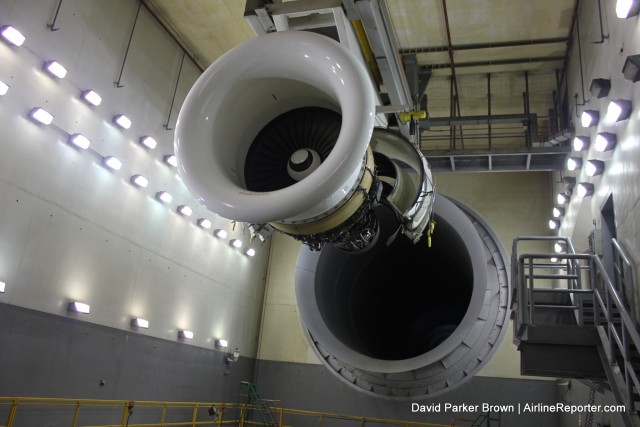
Engine testing at EGAT in Taipei
Then I stopped to take some photos of a big tourist bus that had EVA Air’s livery on it. I felt it odd that the guy was going up to the bus. Wait a second… was this my ride? Sure was… my ride was a super sweet EVA-liveried bus all for me (and the driver… and my guide). I guess they had run out of vans and cars and didn’t want me to be left waiting, so they sent a bus. I was totally okay with that.
This was one of many things that showed how much that EGAT takes pride in attention to detail. A high level of precision is important when giving someone a tour, but way more important when working on an airline’s multi-million dollar aircraft.
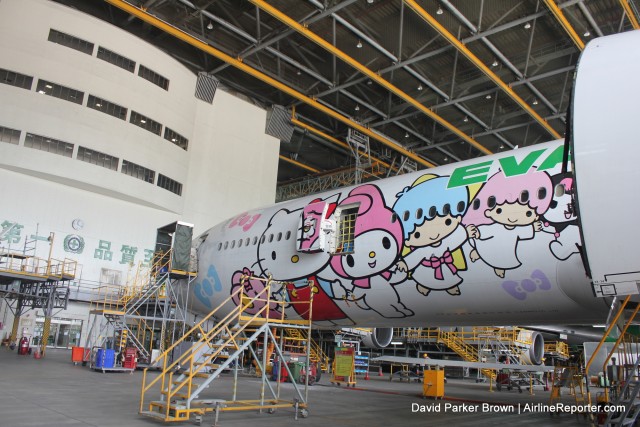
One of EVA Air’s Hello Kitty planes being worked on
My tour started with a nice welcome on their TV screen in the lobby. Then I was met by Kin Chong, who is the executive vice president, business coordination development at Evergreen. We had some time to sit down, chat, and review a presentation on EGAT. Afterwards, I put on a hardhat (got to love those things) and we made our way into the depths of the facility.
The first aircraft I see: a Hello Kitty Boeing 777. I had to chuckle, since I just flew on EVA’s newest Hello Kitty 777 and thought I might of had a break from the smiling “non-cat” for a while, but I couldn’t seem to get away. Oh well, I re-focused my attention to learning.
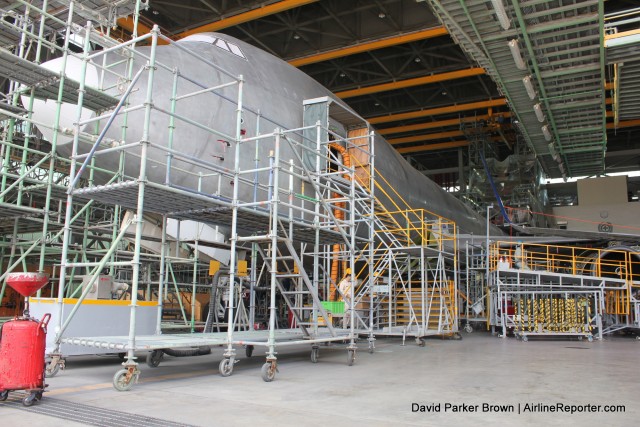
A Boeing 747-400F without paint
Evergreen Aviation Technologies was created in 1991 with only 100 employees and the mission to fix EVA Air aircraft. Today, the facility has four hangars, over 2,000 employees, and works on planes from different airlines around the world. Actually, about 70% of the aircraft today are from other airlines than EVA. They do everything from line maintenance, to engine overhaul, to complete nose-to-tail re-skins.
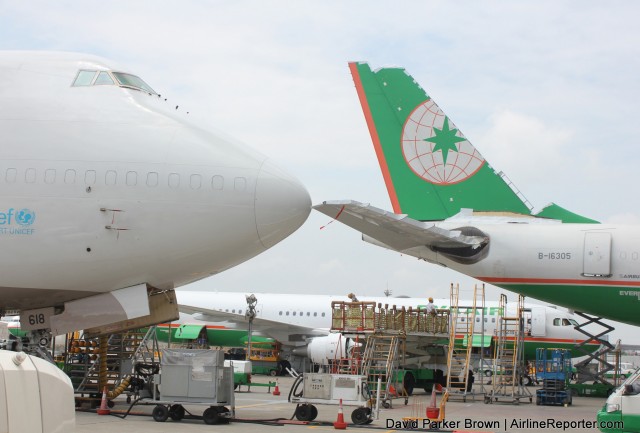
From nose to tail, EGAT takes care of the planes – that is an Airbus A330 tail
The place is big enough as it is, but there is a fifth hangar being built. The first hangar can handle three wide-body planes, the second can do two wide and two narrow, the third can handle two narrow, and the fourth is a “shelter” that can house just one narrow. This is not to mention the engine shop, offices, inventory, and tarmac space as well.
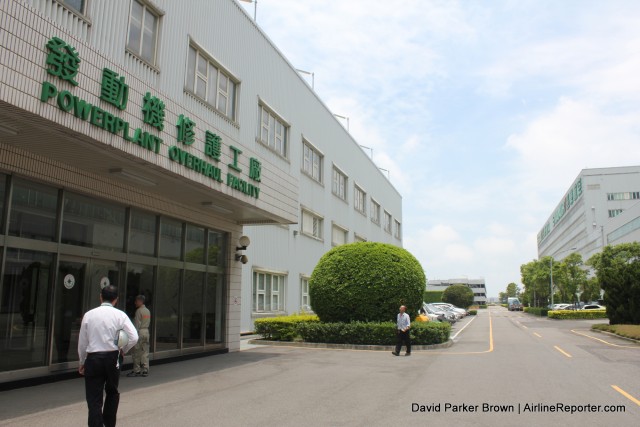
Heading into the engine shop at EGAT
EGAT considers themselves a “boutique” Maintenance, Repair, and Overhaul (MRO) facility, and their goal is not to just expand and increase profits. They openingly admit that they won’t be the cheapest, but they are still competitive.
Their stock holders are the employees, and they want to work more on maintaining quality and building relationships; those are not always in alignment with rapid growth or huge profits.. Yes, yes, most any MRO is going to say that, but they have a way to make it happen. Actually… that is sort of their tagline: “Make it happen.”
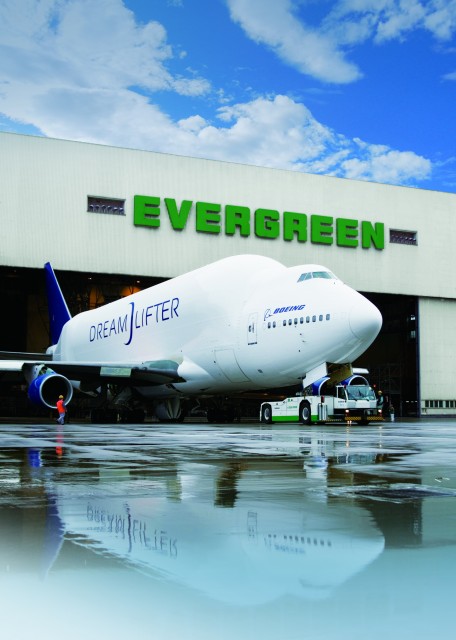
Dreamlifter ready for service – Photo: Evergreen
So, when Boeing was asking for a plane larger than the 747 to haul Dreamliner parts around the world… Evergreen made it happen. This is where the 747-based Dreamlifters were born. EGAT won the contract in 2006 to convert four Boeing 747-400s into the Dreamlifters, and then soon delivered.
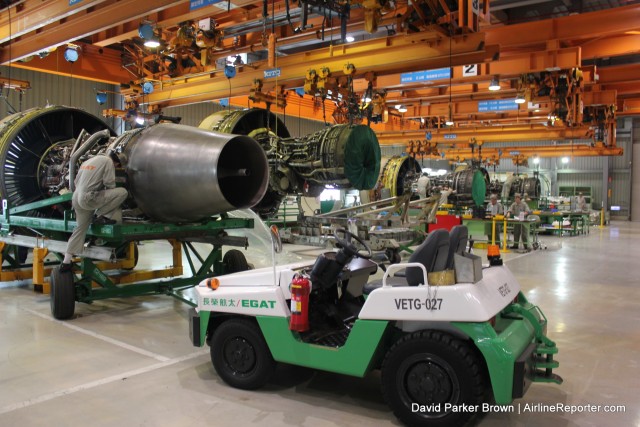
Multiple engines being worked on at EGAT
EGAT works to keep up with new technologies. To help handle the maintenance on the next generation of GE engines, EGAT partnered with GE, creating GE Evergreen Engine Services. Currently, they are set to do quick repairs and the test cell should be ready to handle GEnx engines by September. They hope to offer modular repairs by 2017 and then complete overalls by 2018. The engines are still new, so hopefully none will be needing overhauls before then.
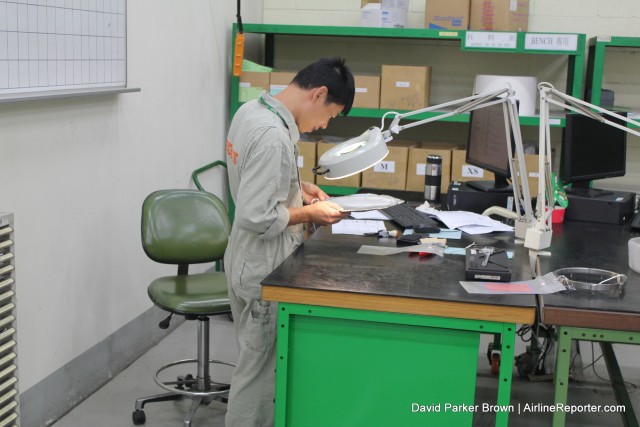
Engine parts being inspected by one of the EGAT technicians
Before my tour, I had not realized that when an airline takes delivery of a new aircraft, they often stagger the engines. As in, they will take off one (or even both) of the new engines and swap them within the fleet with used ones. This makes sense. Sort of like replacing both headlights when just one goes out, since it is likely the other might go out soon. The airline wants to have engines on each plane with different hours on them, so that the maintenance timelines will not be aligned.
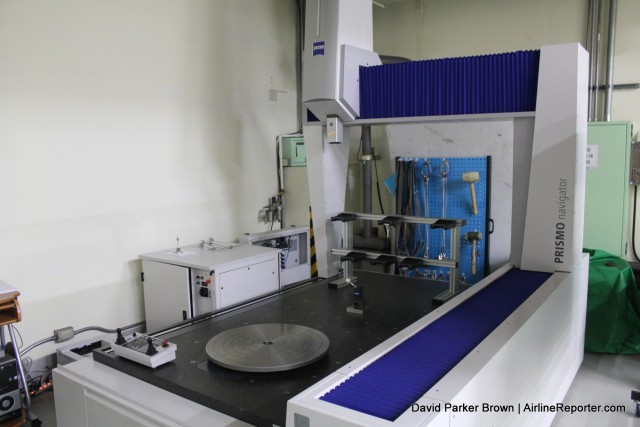
Machine that steam cleans the parts before being inspected further
Even though EGAT might not be fully motivated by profits, they are still looking to be a successful enterprise. When an aircraft comes in for some major work, Evergreen will work with the airline to see if there are any other upgrades to be done while their plane is already out of service. Things like winglets or electronic flight bags can be installed, without adding much time to the plane’s maintenance schedule.
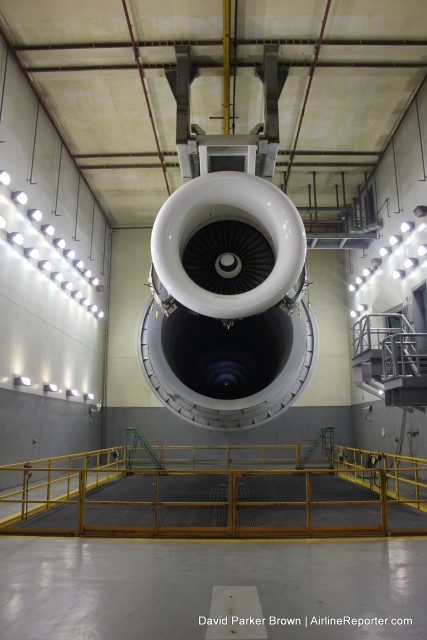
Engine being tested before being put back on the plane
One of the coolest parts of the tour was checking out the 120,00- lb test cell. It was great timing, since there was an engine in place, but it wasn’t being tested. I could only imagine the sound and the amount of wind going through that bad-boy when a GE90 is in there at full-throttle.
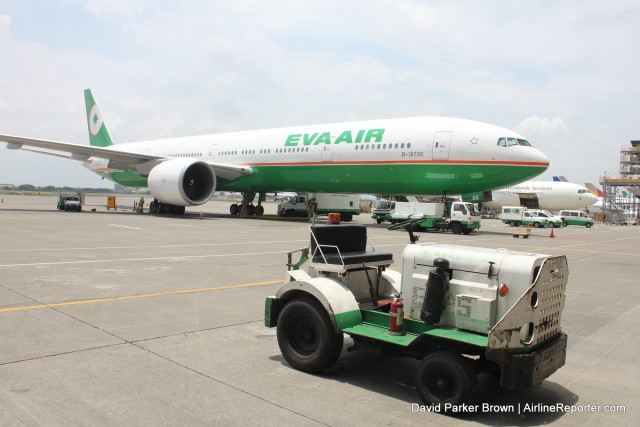
Heading outside to the next hangar. Plus, a nice EVA tug.
By the time my tour concluded, I had interacted with many different EVA Air and Evergreen employees. I have to say that they don’t just talk-the-talk, but they also walk-the-walk. Not just with getting the job done, but also being passionate about what they do and their company.
I think that they got a kick of me doing the tour as well. Even though it was just me and two Evergreen folks, I kept having to ask them to slow down. They weren’t used to having media that not only cared, but was actually a bit giddy — it seemed to excite them. And, of course, I wanted to make sure that I took tons of photos and also absorbed the AvGeekiness.
I know that if I had my own private airliner jet, I would entrust EGAT to take care of it. And that is saying something, because I would want to make sure that thing is treated like royalty!
View even more photos of my EGAT tour with EVA Air
NOTE: EVA Air flew me to and from Taipei and took care of accommodations as part of their launching service to Houston. Opinions are my own.
Comments are closed here.
Learned a lot of new stuff today, most interestingly that the LCFs weren’t retrofitted by Boeing– I always assumed they had been. Cool!
JL | AirlineReporter
Awesome report David. I think I would have been just as giddy!
Was the A330 with the missing parts on the tail being repaired or scrapped?
Great info especially about the Dreamlifter. I was really surprised to read that it wasn’t designed by Boeing.
Just repairs, it’s been busy around Asia:
http://www.flightradar24.com/data/airplanes/b-16305